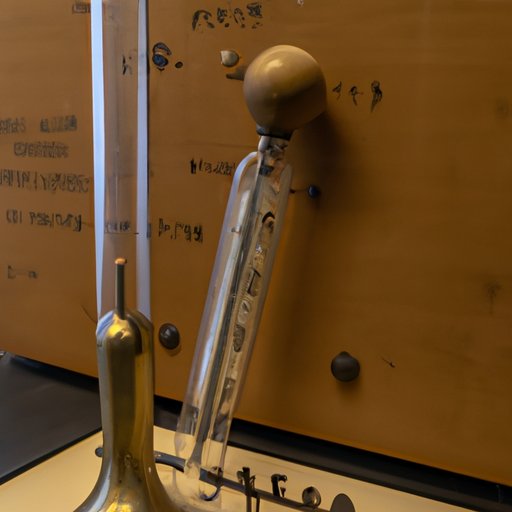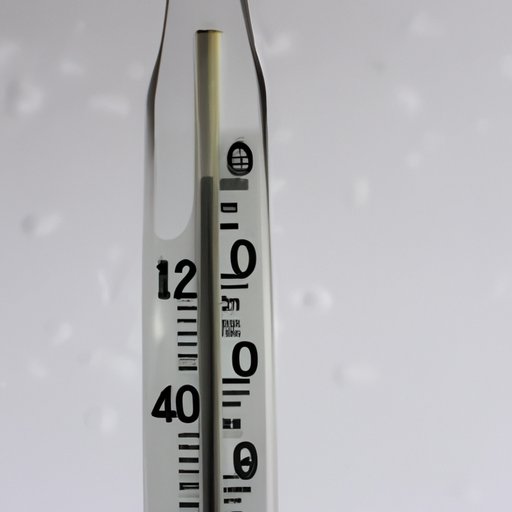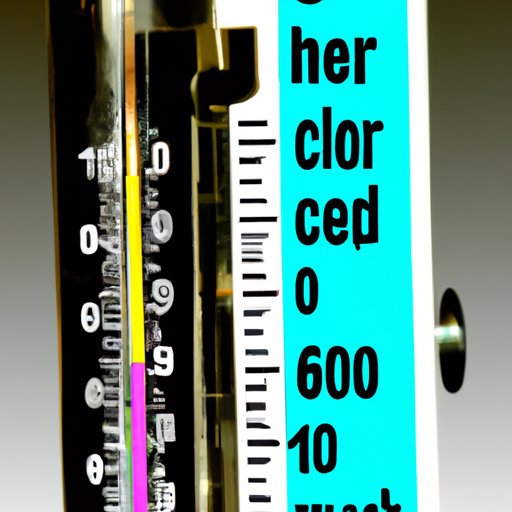Introduction
The thermometer is an essential tool in many aspects of day-to-day life. It is used to measure temperature, a crucial factor in many scientific and medical processes. But who invented the thermometer? This article will explore the history and development of this important device, as well as its impact on science and medicine.
Biographical Profile of the Inventor of the Thermometer
The thermometer was invented by Italian physician Sanctorius Sanctorius in the 1600s. Sanctorius was born in Padua, Italy, in 1561 and studied medicine at the University of Padua. He was a pioneering physician and scientist, and his work focused on physiology, metabolism, and health.
Sanctorius was the first person to accurately measure the human body’s temperature through the use of a thermometer. He developed a primitive form of the device using water and air-filled glass tubes. The device worked by measuring the expansion and contraction of the water and air as the temperature changed. The invention of the thermometer revolutionized the study of human physiology and medicine.

Exploring the History and Development of the Thermometer
Early thermometers were crude devices, with limited accuracy. Over time, advances in technology allowed for more precise measurements. In 1714, German physicist Daniel Gabriel Fahrenheit developed a mercury thermometer that featured a scale calibrated to a specific temperature range. This type of thermometer quickly became the industry standard.
In 1742, Swedish astronomer Anders Celsius devised a temperature scale based on the freezing and boiling points of water. His scale reversed the order of Fahrenheit’s scale, with 0 representing the freezing point of water and 100 representing the boiling point. This scale is still in use today.
In the 19th century, advances in thermometer technology made it possible to measure temperatures more precisely. In 1866, Lord Kelvin developed the absolute temperature scale, which is based on the idea that all temperatures can be measured relative to absolute zero (-273.15 degrees Celsius). This scale is still used today in scientific research.

The Impact of the Thermometer on Science and Medicine
The invention of the thermometer has had a profound impact on science and medicine. Accurate temperature measurements are essential for many scientific experiments and medical procedures. For example, thermometers allow scientists to measure the temperature of chemical reactions and the temperature of living things. They also allow doctors to diagnose illnesses and monitor the progress of treatments.
Accurate temperature measurements are also important in the study of climate change. Scientists use thermometers to measure temperatures around the world and track changes in temperature over time. This data is essential for understanding the effects of climate change on the planet.
A Timeline of Thermometer Advances
1600s: Sanctorius Sanctorius invents the thermometer.
1714: Daniel Gabriel Fahrenheit develops the mercury thermometer.
1742: Anders Celsius devises the Celsius temperature scale.
1866: Lord Kelvin develops the absolute temperature scale.
1900s: Digital thermometers become available, allowing for more accurate readings.
2000s: Smart thermometers are developed, allowing for remote monitoring of temperature.

How the Thermometer Changed Our Understanding of Temperature
The invention of the thermometer allowed us to measure temperature more accurately than ever before. This opened up new possibilities for understanding the environment and predicting weather patterns. For example, meteorologists now use thermometers to measure temperatures in the atmosphere and forecast weather events such as rain and snow.
Accurate temperature measurements have also allowed us to better understand the impacts of global warming. By measuring temperatures around the world, scientists can track changes in temperature over time and gain insights into the effects of climate change.
The Invention of the Thermometer: An Overview
The thermometer is an essential tool for measuring temperature. Its invention revolutionized the study of human physiology and medicine, and it has had a profound impact on science and everyday life. Today, modern thermometers are capable of taking highly accurate readings with minimal effort. They have enabled us to better understand the environment and predict weather patterns, and they are essential tools for medical diagnosis and treatments.
Conclusion
The invention of the thermometer has had a profound impact on science and medicine. Its ability to accurately measure temperature has allowed us to better understand the environment and predict weather patterns. It has also revolutionized medical diagnosis and treatments. The thermometer is an essential tool in many aspects of day-to-day life, and its invention has changed the way we view the world.
(Note: Is this article not meeting your expectations? Do you have knowledge or insights to share? Unlock new opportunities and expand your reach by joining our authors team. Click Registration to join us and share your expertise with our readers.)
